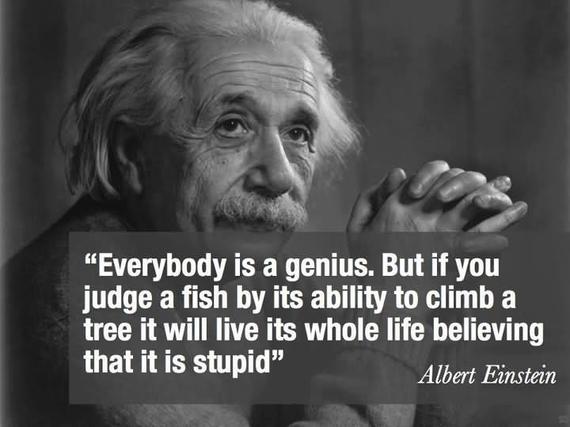Albert Einstein purportedly said, "Everybody is a genius. But if you judge a fish by its ability to climb a tree, it will live its whole life believing that it is stupid."
Sometimes I wonder if the standardized testing we do in many of our schools today does just that: judges fish on their climbing ability. Many assessments evaluate unnecessary academic skills that have no basis in determining if a child is ready to move on to the next level of learning.
Teaching Fish to Climb Trees
A recent conversation with my friend Teresa*, a former teacher, drove home the frustrations many devoted educators feel towards testing regimes that lack nuance and context. Poignantly, she described how she worked day-in and day-out to teach her 3rd grade class of English Language Learners to read while she was simultaneously and consistently being compared to her counterpart who was leading a class of 3rd grade native English speakers.
It didn't matter that Teresa had brought her students' reading ability up from a kindergarten level at the beginning of the school year to a 2nd grade level at the end of the school year -- she was still behind: both in absolute terms (based on state standards) and in relative terms (vs. her third grade teacher counterpart).
At the end of the year, Teresa became part of a RIF (Reduction in Force). This required her to move schools due to a lack of funding at her current school. After several years of such moves, she left the profession.
Teresa summed up her decision to leave the teaching profession this way, "It's one thing to be paid one of the lowest professional salaries in America; it's completely untenable to be paid at that level and also disrespected."
Mothers Against Drunk Testing
Teresa is clearly not alone in her feelings toward our standardized tests and their unintended consequences for both students and teachers. When it comes to end-of-year statewide tests, there is a growing opt-out movement forming, and "assessment" is quickly becoming a bad word in academic circles. There is even an advocacy group now called Mothers Against Drunk Testing.
But in this opt-out movement, are we throwing the baby out with the bathwater? Does the concept of assessment have merit, but the implementation lack credibility?
For example, if assessments could be used less as a stick to punish the less "successful" and more as a guide to ensure that both students and teachers get the support and resources they need, would we look at tests differently?
Formative vs. Summative Assessments
Herein lies the difference between formative assessments and summative assessments. Formative assessments occur as a precursor to the personalization, instruction, and customization of a student's learning plan and teacher's lesson plan. Formative assessments guide. Summative assessments, such as the standardized testing we're more familiar with, merely summarize.
At Istation, the edtech company where I work, we provide digital and face-to-face personalized learning experiences for students in the subjects of reading, Spanish and math. We recognize the importance of standards in an educational setting and provide teachers with the kind of rigorous curriculum that the standards demand.
Istation's progress-monitoring tools are designed to save teachers time and to pinpoint the personal needs of each student. Those same progress monitors can of course also be used to measure growth over an academic cycle or a multi-year period. Importantly, the individual assessment technology embedded in Istation and similar programs is dynamic and part of the curriculum; this is fundamental as it ensures students' progress is measured while they are engaged in the actual learning process.
Many parents are concerned about the frequency of testing and the time it takes away from classroom instruction. But modern formative testing does not require sacrificing a morning to scantrons and number 2 pencils. Adaptive technology allows measurement and instruction to occur simultaneously and reinforce each other as programs dynamically adjust to each student's strengths and areas for improvement.
One of the most important components of strong formative assessments is that they show growth (or lack thereof) over time for all students. Put differently, formative testing measures not only how a student performs compared to an average but also how that student performs compared to herself in prior periods. Istation's screeners are particularly telling, because they show the risk-level of failure associated with each child and recommend how intensive instruction should or should not be.
A Brighter Future
In listening to Teresa's heart-breaking stories, I was reminded that unfair evaluations (in any circumstance) can lead to toxic cultures and eventually exits from a profession or a career path.
Instead of simply measuring a student's performance at a single point in time, let's put greater emphasis on progress over time. End-of-grade assessments do have their place, but there is even greater value in incorporating progress-monitoring tools and formative assessments: they allow us to measure growth over time and give teachers necessary insight to intervene appropriately.
In short, if we want to keep talented professionals and students engaged in our educational system, we need to do a better job of assessing our own assessments. Gains in classroom technology mean that schools are no longer limited to tests designed to determine whether every student meets a minimum standard once a year. We can also measure the individual progress each student makes in a dynamic and non-obtrusive way throughout the year.
*Name has been changed


